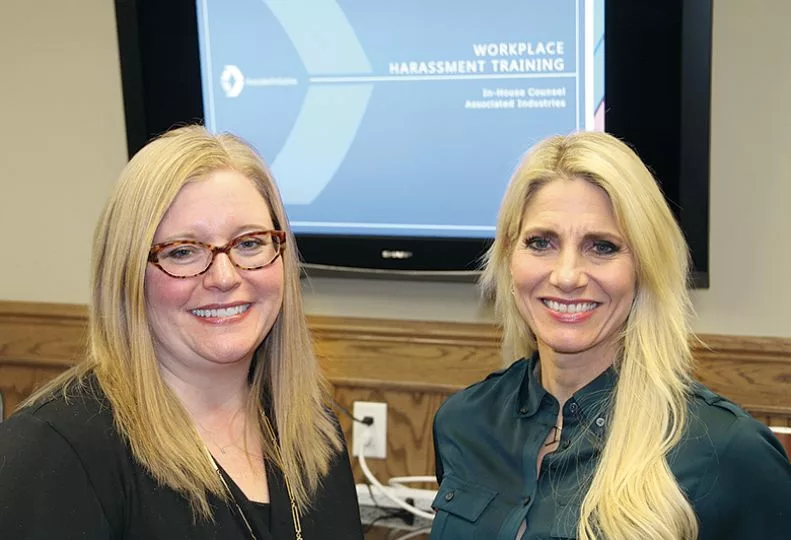
Home » Sexual harassment training increases in Spokane
Sexual harassment training increases in Spokane
Demand for policy reviews up 50 percent, consultants say

December 21, 2017
As sexual harassment scandals continue to dominate national headlines, Spokane-area employers have begun to take notice, with many looking to revisit policies and training, some employment law and policy advisers here are observing.
“The number of requests we receive from clients for policy reviews and trainings have increased by 50 percent this year,” says employment adviser Nicole Tedrow. “Helping employers to address harassment issues in the workplace is a huge part of what we’re doing right now.”
Tedrow serves as chief legal counsel for Associated Industries of the Inland Northwest, a Spokane-based employer consulting services provider.
Before this year, most employers seemed to view updating harassment policies and training more as an annual maintenance checkup, Tedrow says.
“It was something larger companies usually did as a matter of course, not necessarily because they were seeing complaints,” she says. “Now there’s a sense of urgency, as more people come to realize how common these issues are, and that they can affect employers regardless of size or industry.”
For fiscal year 2016, which ended Sept. 30, 2016, the U.S. Equal Employment Opportunity Commission, the federal agency responsible for enforcing laws that prevent discrimination and harassment, reported its staff resolved about 28,800 claims of employment discrimination based on sex, and recovered $137.3 million for victims, along with instituting changes to employer policies to help remedy future violations. That total was higher than the 27,000 claims the organization reported in 2015, but less than the 10-year peak of 32,700 total claims the agency reported in fiscal 2011.
The EEOC doesn’t have data yet for fiscal 2017, and the Washington state Human Rights Commission, which processes state based complaints, couldn’t be reached immediately for comment.
Although more recent EEOC data wasn’t available for comparison, Tedrow says it’s common for increased awareness to result in additional harassment and discrimination complaints.
“Anytime you raise awareness, the number of complaints reported also increases,” she says. “We often have to remind clients it’s not the training itself that causes increased complaints, rather the increase comes from employees becoming aware that someone is listening and feeling comfortable coming forward.”
Tedrow says sexual harassment in the workplace can include unwelcome sexual advances, requests for sexual favors, and other verbal or physical harassment of a sexual nature, or offensive remarks about a person’s sex.
“There are two forms of unlawful harassment,” she says. “One is quid pro quo, when the victim puts up with discriminatory behaviors either to avoid a negative consequence or to gain a benefit. The other, more common form we see is unwelcome behaviors that lead to a hostile work environment.”
Tedrow says the four elements of a hostile work environment include behavior that is unwelcome, behavior that discriminates based on the victim’s sex, behavior that affects the terms or conditions of the victim’s employment, and such behavior of which an employer is aware.
“Some of the examples we use in training are things like unwanted physical contact, suggestive gestures, repeated requests for sex or dates, catcalls and whistling, and electronic displays of suggestive jokes or graphics,” she says.
While the law doesn’t prohibit simple teasing, offhand comments, or isolated incidents that aren’t deemed serious, Tedrow says harassment is illegal when it’s frequent or severe enough to create a hostile work environment—or when it results in an adverse employment decision, such as a victim being fired or demoted.
“Many of these behaviors might seem minor, but it’s when they’ve become frequent and tolerated that we start to see them lead into to a hostile work environment,” she says.
As more businesses begin to take a closer look at their harassment policies and training, Tedrow says she anticipates the number of complaints will continue to grow.
Diane Quincy, the Spokane-based director of leadership and organizational development for Spokane energy company Avista Corp., says she sees the current national conversation as an opportunity for companies both large and small to revisit their policies.
“If a business doesn’t already have a policy in place, it’s a good time to consider creating one,” she says. “You need to be sure to train both new and existing employees, and provide multiple avenues for communication and reporting.”
Quincy says Avista has had anti-harassment and nondiscrimination policies in place for a long time.
“We periodically revisit policies to make sure our protocols and training are still relevant, but national trends like this do provide an extra layer of review to make sure those procedures are still effective,” she says.
Angela Hayes, Tedrow’s colleague and senior legal counsel at Associated Industries of the Inland Northwest, agrees that reviewing the company’s current policy is an important first step when it comes to advising clients on updating their policies and training.
“Employers should look to have an updated harassment policy, as well as management staff that is committed to preventing harassment,” Hayes says. “Most have a sexual harassment policy, but a good policy also needs to cover harassment based on race, religion, disabilities, and other differences.”
Hayes, like Tedrow, conducts custom employment law consulting and review work for Associated Industries’ member clients.
Employers need to ensure adequate training of both employees and supervisors on how to report a complaint, as well as how to investigate and resolve it, Hayes says.
“Supervisors need to know how to process complaints when employees come to them,” she says. “Once they’re aware of a complaint, they’re responsible for following up and taking appropriate action.”
Hayes says outdated policies often require employees to report complaints within a certain timeframe, or in writing, and some even encourage employees to first confront their harasser before bringing the issue to a supervisor.
“These are all barriers that prevent employees from reporting complaints,” she says. “A good policy includes coverage of all forms of harassment, multiple channels for reporting incidents, and an anti-retaliation statement, so employees can feel safe in reporting or assisting in investigating incidents without fear.”
Hayes says she generally discourages having a zero-tolerance policy, because such policies generally treat all violations the same, with strict punishment up to and including immediate termination.
“Zero-tolerance policies take away some of the employer’s flexibility in determining the level of discipline needed,” she says. “There’s no room to address behaviors with less harsh punishments such as a temporary suspension or retraining.”
Rather than a zero-tolerance policy, Hayes encourages employers to develop a system for investigating complaints and determining appropriate discipline.
“Most employees who report aren’t looking to get someone fired; they just want the behavior to stop,” she says. “So if an employee knows their company has a zero-tolerance policy, they may be discouraged from reporting less egregious behaviors for fear the person they’re complaining about will lose their job.”
During this holiday season, Hayes and Tedrow say they’ve also heard from employers who are looking for advice on planning holiday parties, which companies often choose to host after hours, at off-site venues that serve alcohol.
“With the heighten-ed awareness, we have seen employers who are considering scaling back their parties, or planning them differently this year,” says Hayes. “For some, that might mean planning a smaller event during daylight hours, and not serving alcohol.”
Hayes says she also encourages employers to remind their staff that just because they’re not working, or aren’t on work premises, doesn’t mean the workplace harassment policy doesn’t apply.
“It should be clear that employees are still expected to act appropriately at all times,” she says.
Although recent increased national awareness of sexual harassment in the workplace hasn’t prompted Avista to scale back social events or change its current polices, Quincy says the company did take the time this month to send out additional communications.
“We did send out a reminder for employees, outlining the policies we have in place, and re-enforcing our commitment to continued awareness and training,” she says.
Robin Parse, the office manager for family-owned and operated Wendle Motors Inc., a Spokane-based auto dealer, says the company revisits its anti-harassment policies and training annually. It also requires both employees and supervisors to watch videos outlining those policies and procedures.
Parse says the company, which has 144 employees, opted this year to have Associated Industries stop by for a live anti-harassment presentation, although that decision wasn’t necessarily due to heightened national awareness of sexual harassment.
“We do worry sometimes that videos and tests aren’t always the best way to help people retain information,” she says. “But we liked the idea of a presentation, because it gives listeners a chance to actively participate and ask questions.”
Parse says she feels the interactive nature of the presentation did help add to employee awareness and education.
“I think it can be easy to forget that we all interpret things differently, and we’re not always aware of other’s experiences or circumstances,” she says. “That’s why it’s important to keep employees educated on appropriate behaviors, so they have the knowledge and tools they need to feel comfortable and productive in their workplace.”
Latest News
Related Articles




